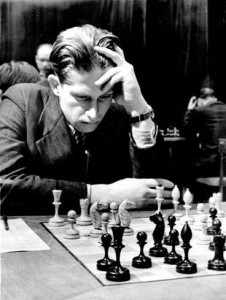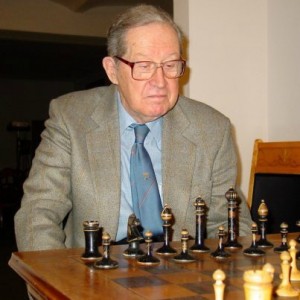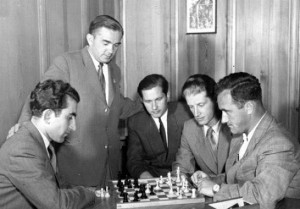
Welcome to the February edition of the GM Spotlight. This month we are going to be focusing on the oldest GM on the list, GM Yuri Averbakh. At 92, GM Averbakh has a rating of 2445 and is the 280th highest rated player in Russia. He earned the IM title in 1951 and the GM title in 1952. As one might expect, GM Averbakh has had a long and illustrious career. He contributed to every aspect of the game and wrote many books. In the late 1960s, he played less competitive chess. When he was playing, he earned a reputation for being a solid technician. He won many beautiful endings throughout his career and composed many endgame studies. His first major success was in the Moscow Championship in 1949. He finished ahead of players like Andor Lilienthal, Yakov Estrin and Vladimir Simagin. In 1954, he won the USSR Chess Championship. In 1956, he tied for first with Taimanov and Boris Spassky. He recently wrote a memoir called, “Centre-Stage and Behind the Scenes: A personal Memoir“. I don’t believe he’s on ICC and to my knowledge; we haven’t ever played any games together. His main period of activity was between 1950 to roughly 1960. He did play in many events after 1960. The last event I could find was a match he played in 2007. Averbakh is the eponym for the following openings:
Kings Indian Defense: Averbakh Variation (E73):
Kings Indian Defense: Semi-Averbakh System (E73):
Modern Defense: Averbakh Variation (A42):

One of my favorite anecdotes about GM Averbakh occurred during a game against Bobby Fischer. Commentary from an interview that he did for the National Educational Chess Association website:
On move 20, I hear draw from Bobby Fischer?[sic] With only ten minutes on the clock for both of us, in an unclear position and having to reach move 40 before we get any more time, I agreed. “After the game,” he continued, “I heard people ask Bobby Fischer why he proposed a draw. He said because I didn’t want to lose to a grandmaster. When the same question was posed to me I answered: because I didn’t want to lose to a boy.”
Without further ado, here are five interesting games from GM Averbakh. The first game is against Geller from the 1950 USSR Championships. Chessgames.com has named this game, “Bakh in the USSR”:
The next game is his game against Vladimir Zak from 1947. Chessgames.com has called this game “Zak Against the Wall”. I particularly liked this game because of the somewhat uncharacteristic attack that Averbakh displays. Averbakh isn’t known for his attacking prowess. His games were long grinds that he won by outworking his opponents in the ending.
The next game is against Mark Taimanov from the 1953 Zurich Candidates tournament. Like the previous game, I liked the attack that Averbakh displayed. GM David Bronstein analyzed this game in his book, “Zurich International Chess Tournament, 1953“:
This next game is more “characteristic” of GM Averbakh. He grinds down a young Petrosian after snatching a pawn in the opening. Averbakh employs an exchange sacrifice and overpowers Petrosian’s two rooks.
The final game is the sort of technical grind that Averbakh is known for. His handlings of the same colored Bishop ending are worth further examination. Here he demonstrates how important healthy pawn structures are in the ending. He takes his time to target the weak pawns, gain space and optimize his position. Note his patience as he maximizes his advantage. After it’s clear he can do nothing more to improve his position; he sacrifices his bishop and wins the game.


1 comment for “February 2015 Grandmaster Spotlight: Yuri Averbakh”